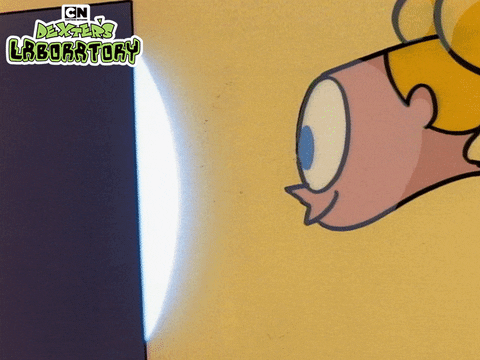- How Not To Suck At Writing
- Posts
- Would you like to keep your readers glued to your writing?
Would you like to keep your readers glued to your writing?
Here are 7 tricks of the trade
A gun to my head, a knife to my throat. I get asked:
What's one crucial thing to get right first if I want to keep readers glued to my writing?

Gif by cartoonnetwork on Giphy
Easy. Write in a natural, conversational style. In other words, write like how you talk.
You don’t hear people talk corporate in everyday language. Even the royals don’t speak the royal language when talking among them. I bet they use “Crikey” and “Bloody” like regular British.
So, don’t be too serious. It’s boring. Loosen up. Show your personality. Be simple and casual in your writing.
So, how do you do that? Well…
You must remember this first if you want to achieve a conversational writing style:
If you must choose between writing naturally and grammatically correct, write naturally.
Okay so here are 7 tricks to write in a natural, conversational style.
1. End with a preposition
Of what are you afraid? | What are you afraid of? |
To whom do you look when you need advice? | When you need advice, who do you look for? |
The buyer persona is to whom you want to sell. | The buyer persona is who you want to sell to. |
I have previously tried it. | I’ve tried it before. |
2. Use sentence fragments/phrases
Sentence fragments are parts of a sentence also known as phrases. They don’t have either a subject or a verb. If left alone, they don’t make sense.
And, sentence fragments/phrases are used to add drama and rhythm to your writing.
For example, this is a complete sentence with a subject and a verb.
You have to remember that a complete sentence must have a subject and a verb.
To emphasize the point, I picked the sentence fragment/phrase “remember” and deleted “You have to” and “that”. So, it becomes
Remember. A complete sentence must have a subject and a verb.
Another example, these are complete sentences with a subject and a verb.
Son Heung Min is the man.
Son Heung Min is the myth
Son Heung Min is the legend.
When you isolate them, they become
Son Heung Min (noun)
The man (noun phrase)
The myth (noun phrase)
The legend (noun phrase)
If you just blurted one of these phrases, they don’t make sense at all because there’s no context.
But when you combine them, it becomes powerful. Even though they are not a sentence but only a series of sentence fragments/phrases.
Son Heung Min. The man, the myth, the legend.

Gif by spursofficial on Giphy
Also, sentence fragments can be used to save space by conveying information using fewer words.
Our loyalty program is simple. Once you have accumulated five stamps, you’re entitled to a free car wash.
Our loyalty program is simple. Get five stamps, get a free car wash.
3. Begin sentences with conjunctions
Starting a sentence with or, and, but, or for makes the transition between thoughts smoother. Also, it allows you to break large sentences into smaller ones and add better rhythm to them.
You can have the most grand marketing in the world but without targeted messaging, you may still lose to someone with a worse product and a better message. | You can have the most grand marketing in the world. But without targeted messaging, you may still lose to someone with a worse product and a better message. |
4. Use one-sentence paragraphs
An occasional one-sentence paragraph can liven up your work. It’s like a sudden curve in the road that shocks you to wakefulness again.
Example
For many tech companies, technical writing is a difficult hire. Most engineers can’t write. Most writers can’t code. You need that rare someone with solid technical and writing know-how.
That’s where I can help.
Another example.
“We have a human that’s been alive for 3 weeks with the virus. Almost a record. You should take a look.” I said, laying on my back, with my arms folded over my head. I felt Sirini turn his head to look at me.
“Why can’t you say anything normal after sex?”

5. Vary sentence length
I’ve never seen anyone explain this better than Gary Provost.

Here’s another example. It’s funny to me hahaha.

6. Use contractions
This is straightforward. You’re, they’re, it’s, we’ve, I’m, here’s…
7. Use colloquial expressions
A colloquial expression is an informal/casual word or phrase used in everyday conversation. According to Grammarly,
Colloquial language makes writing less formal and more approachable—less “presenting to the class,” more “chatting in the hall.”
Here are some examples.
Contractions like “ain’t,” “gonna,” and “y’all”
Piece of cake: easy
Hang in there: endure
Cutting corners: take shortcuts
Spill the beans/tea: reveal secret
Rip-off: overprice or fake item, or stealing
Glued: paying very close attention
To conclude, when you write simply, you become your reader’s friend. When you don’t, you become a bore.
I have pretty much used all of those tricks in this post. If you need more examples for each trick, you can read this post again. Or read other posts.
If you find this helpful, please forward this to your friends or colleagues who write. Sure they'd thank you for sharing this newsletter with them. Imagine the impact you could have on their career 🤩
Got any questions related to writing? Just reply to this newsletter. Also, my DMs on Twitter (@notsuckwriting) are always open with open arms!